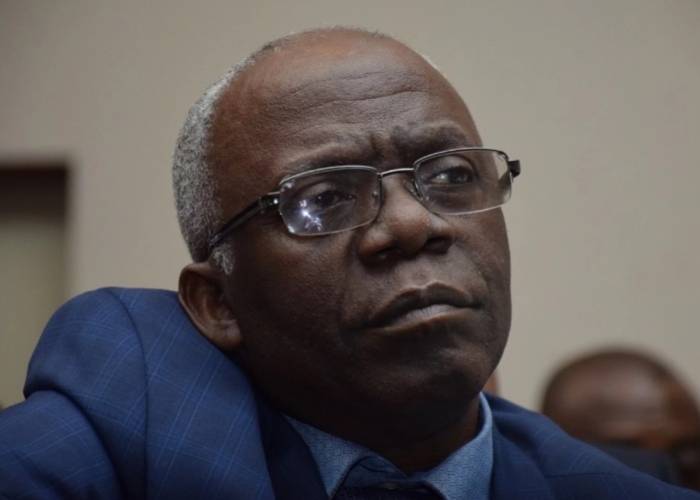The Economic and Financial Crimes Commission (EFCC) is charged with the responsibility of enforcing the provisions of all laws relating to economic and financial crimes, Africa’s leading human rights lawyer, Mr. Femi Falana (SAN) has said.
Consequently, according to the senior advocate, the anti-graft commission is empowered to cause investigations to be conducted into the properties of any person as stipulated under Section 7 (1) (b) of the EFCC Act, 2004.
Also yesterday, Transparency International (TI) argued that if the provisions of the Bank Employees, etc. (Declaration of Assets) Act, 1986 were effectively enforced, Nigeria could save between $15 billion and $18 billion illicit financial flows (IFFs) annually.
Falana clarified the roles of the EFCC in a response to inquiries on whether bankers or staff members of Corporate Nigeria are under any constitutional or legal obligation to disclose or declare their assets to the EFCC.
The EFCC Chairman, Mr Abdulrasheed Bawa, had directed that all workers in the Nigerian financial system, especially bankers, should declare their assets latest by June 1.
Bawa had claimed that it was mandatory for every employee of a bank to make full disclosure of assets upon employment, and annually in subsequent years under sections 1 and 7 of the Bank Employees (Declaration of Assets) Act, 1986.
While Section 1(1) of the Act states that every employee of a bank shall, within fourteen days of the commencement of this Act, make a full disclosure of all his assets, Section 7(1) stipulates that it shall be an offence for an employee of a bank to own assets in excess of his legitimate, known and provable income and assets.
Section 7(2) reads: “Any employee guilty of an offence under subsection (1) of this section shall on conviction be liable to imprisonment for ten years and shall, in addition, forfeit the excess assets or its equivalent in money to the Federal Government.”
In his response to inquiries, Falana explained that the Bank Employees (Declaration of Assets) Act “is an existing law,” which according to him, had been in operation since it was enacted in 1986.
Clarifying the roles of the EFCC with respect to the Act, Falana said the anti-graft agency “is charged with the responsibility of enforcing the provisions of all laws relating to economic and financial crimes.”
Under the law, the human rights lawyer said every governor of the Central Bank of Nigeria (CBN), bank executives, directors and board members are also required to declare their assets because they are dealing with public funds.
Specifically, he pointed out that the Banks and other Financial Institutions Act (BOFIA) “is one of such laws. Since the Bank Employees Declaration of Assets Act pertains to economic and financial crimes, the EFCC is empowered to enforce the law.”
Aside, Falana argued that by Section 7 (1) (b) of the EFCC Act the Commission “is empowered to cause investigations to be conducted into the properties of any person if it appears to the commission that the person’s lifestyle and extent of the properties are not justified by his source of income.”
He disclosed that the EFCC had been enforcing this particular provision to compel every suspect to fill forms containing a list of their assets.
In August 2016, Falana noted that the CBN directed employees in all commercial banks in the country “to declare their assets. The directive was complied with. Bank employees who fail to comply with the law may have themselves to blame.”
He disclosed that some bankers were being prosecuted for allegedly contravening the provisions of the Act, noting that it was not the first time that the law has been applied.
According to him, the new chairman of the anti-graft commission is only reminding bank executives and employees of their responsibilities under the law.
However, he said bankers, who are dissatisfied with the law, “are advised to challenge its legal validity in a competent court of law or mobilise the members of the National Assembly to repeal it utterly or amend certain provisions thereof.”
In a statement by its country representative, Mr. Auwal Rafsanjani, TI noted that the Act was enacted in 1986 to ensure that adequate measures were in place to sanitise the nation’s financial system.
Rafsanjani said the measures stipulated in the Act would help prevent money laundering and IFFs through which terrorism is largely funded, to effectively tax bank executives, and to expose illegal financial transactions.
He said: “The banking sector has been largely implicated in money laundering and has been instrumental in the initial entry or placement phase that involves the initial movement of an amount of money earned from criminal activity into some legitimate financial network or institution.
“Despite the powers of and the checks that have been put in place by the CBN and other relevant institutions regulating the sector, it appears that the system is being manipulated as Nigeria loses between $15 and 18 billion annually to IFFs.
“While this has well established roles in hindering economic development, Illicit financial flows are crucial to a variety of illegal activities that undermine global and national security, from organized crime to financing terrorism.
“We use this medium to call out other institutions like national security agencies who have a duty to counter these flows and are related to this context, to throw their full support behind this move by the EFCC, by using available instruments, one of which is the Bank Employees, etc. (Declaration of Assets) Act 1986.
“With the ongoing security crisis in the nation, there couldn’t be a better time for the introduction of this initiative. As regards tax evasion, in 2017, only 214 people in populous Nigeria paid taxes above N20 million,” he said.





